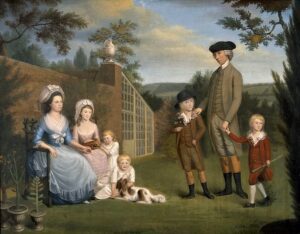JMS Pearce
Hull, England
 |
| Dr. John Coakley Lettsom with his family. From the History of the Medical Society of London. |
John Coakley Lettsom (aka Lettsome) MD FRCP Ed., FRS (1744–1815) is remembered as the physician who founded The Medical Society of London and for his monograph Reflections on the General Treatment and Cure of Fevers.
He was born on Van Dyke in the British Virgin Islands in 1744. He was sent at the age of six to a Quaker school at Penketh near Warrington, Lancashire. There, the Quaker preacher Samuel Fothergill became his guardian and introduced him to his celebrated brother, the physician Dr. John Fothergill,* who first described trigeminal neuralgia. In 1761, after traveling by packhorse to Settle, North Yorkshire, he was apprenticed to Abraham Sutcliffe, a Quaker apothecary. Lettsom’s main hobby was walking in the Yorkshire Dales and collecting minerals, fossils, and plants. Thirty years later, his mineral collection of 700 specimens became an early element of Cambridge College’s geology department, Boston (later Harvard University).
Having completed his apprenticeship, he came to London in 1766, where with John Fothergill’s help he began his training at St. Thomas’s Hospital. The death of his father caused him to return to Van Dyke where his only inheritance was some slaves, whom he quickly freed, leaving himself penniless. He returned to Britain to study with Professor William Cullen (1710–1790), the esteemed physician in Edinburgh.
He extended his studies at Paris and Leyden, obtaining the MD at Leyden in 1769. He returned to London, again with generous patronage from Fothergill, and was admitted Licentiate of the College of Physicians on 25 June 1770, and FRS in 1773. The Quaker Society of Friends warmly supported his practice, which proved successful.
He became a Fellow of the Royal College of Physicians of Edinburgh, FRS, and Fellow of the Linnaean Society. He was a founding member of the Royal Humane Society in 1774, became a pillar of the Royal Jennerian Society, and supported the Society for the Relief of Widows and Orphans of Medical Men, the Society for the Relief of Debtors, and the Philanthropic Society. These many enterprises tell of his boundless dedication and energy.
He wrote many papers, most importantly Hints designed to promote beneficence, temperance, and medical science, revealing his Quaker principles, and Reflections on the General Treatment and Cure of Fevers, 1772; The Natural History of the Tea-tree with Observations on the Medical Qualities of Tea and the effects of Tea drinking, London, 1772. He sent the first smallpox vaccine to America, to Professor Benjamin Waterhouse at the University of Cambridge, Massachusetts, whence throughout the US.
One of his lasting legacies was his founding of The Medical Society of London in 1773. Originally constituted for thirty physicians, thirty surgeons, and thirty apothecaries, its membership grew quickly. Situated at Lettsom House, Chandos Street, it is the oldest medical society in England. Here, its members could meet for the exchange of medical intelligence. There was no other society where different branches of the medical profession could meet on equal terms to learn from one another. The Lettsomian Lecture was established in 1850. The Society flourished and remains active to this day.
Lettsom’s Quaker traditions show plainly in his many acts of charity and support of the downtrodden and impoverished. He promoted Sunday schools, soup kitchens, a bee society, and provisions for the blind, while condemning quackery and intemperance. In the diversity of his interests, he has been compared to Sir Hans Sloane: a Renaissance Man. He died at home, Sambrook Court, Basinghall Street on 1 Nov 1815, and was buried at the Friends’ burial ground, Little Coleman Street, Bunhill Row.
Notes
- This essay is based on chapter 9, “John Coakley Lettsom”, published in Pearce JMS, Quakers in Medicine: “Friends of the truth.” York: Wm Sessions, Ebor Press, 2009.
- * Lettsom wrote the biography The Life and Works of John Fothergill M.D., 3 vols, London, 1784.
JMS PEARCE is a retired neurologist and author with a particular interest in the history of medicine and science.
Spring 2023 | Sections | Physicians of Note

Leave a Reply